Retrospec, a Los Angeles-based ecommerce brand that sells outdoor recreation and fitness gear, is among the latest companies to enter the e-bike market. It will launch its first line on April 21st.
E-bikes have been on the rise lately, spurred in part by the pandemic and a desire for sustainable, outdoor transit.
Retrospec was founded in 2009 by Ely Khakshouri, who began selling bikes out of the back of a van as a student at USC. Over the past decade, Retrospec has expanded to include not just several types of bikes, but gear for skaters, paddle boarders, snowboarders and those looking to build a home gym.
Khakshouri told dot.LA that Retrospec always knew it would enter the e-bike market at some point, it just was a matter of timing.
"It feels like the demand is really there now," he said. "I think we're really highly regarded when it comes to urban cycling and everyday bikes. That's what — as much as many of us enjoy performance bikes and recreational riding — we focus on putting bikes out there that help people get from point A to point B. So, I think this is the biggest no-brainer of all time for us as a company."
Demand for several kinds of e-bikes has increased over the past year. Lime recently announced a $50 million expansion of its LimeBike fleet, thanks in part to an investment round led by Uber last May and the acquisition of Uber's bike-share system, Jump. The Pasadena-based delivery platform URB-E also recently raised a $5 million Series A round to expand its service, which uses high-performance bikes to cart around up to 800 pounds of cargo.


Retrospec's e-bikes will retail between $1,000 to $1,500, and are meant for personal use, ideal for the daily commuter who doesn't want to show up to events winded or sweaty, or who needs to travel further than one might on a standard bike. The idea of going farther is what Khakshouri believes has increased demand for e-bikes among personal riders.
"Whether you're going trail riding or just riding down the boardwalk by the beach, there's always this fear of, 'I have to get back.' I think having the e-bike gives you extra access, and takes that fear and pain away," he said.
Additionally, e-bikes can also help equalize group rides, Khakshouri noted. Riders who need an extra boost to finish a ride or catch up have that via pedal assist, which decreases resistance as the rider pedals, and a throttle, which can completely take over for a fatigued rider or when facing a steep hill. The bikes also have an "easy start" push button that helps riders get going.
"We try to keep things really simple where it doesn't feel like you're driving a complex machine," Khakshouri said. "All of our bikes have a simple, clean aesthetic and one that also is nostalgic of what bikes have always looked like and the history of bikes, so I think that's all going to come through our e-bike line and differentiate us."
Retrospec will start with two e-bike models. The Beaumont 7S Electric Bike can reach up to 20mph and last up to 15 to 25 miles, depending on the battery. It's a stylish option for city riding available in four colors, including soft pink, pale blue, eggshell and matte gray.
The Jax Folding Electric can also reach up to 20 mph and last up to 35 miles, depending on the battery. It has a more rugged design with a foldable frame and thicker tires, and comes in matte black or olive.
While Retrospec is entering the e-bike market late in the pandemic and won't be able to gauge COVID-19's impact on demand for its e-bikes, the company did see an increased interest in their other products, from bikes to home fitness equipment over the last year. People who could no longer use their indoor gyms began looking for ways to exercise at home, and also experienced a renewed interest in outdoor activities. For many companies, including Retrospec, this demand ran up against supply chain issues, as Retrospec quickly sold out of products it couldn't immediately restock.
"A year later, we're still playing catch up," Khakshouri said. "What's cool about that is I think a lot of the used gear out there has gotten another turn. There's been a lot more upcycling that's gone on and that's obviously really good from a sustainability standpoint, too."
Retrospec's next move will be a literal one. It will leave the Vernon headquarters it's outgrown next month for a much larger space in the Inland Empire, and will also open an office in Los Angeles.
This story has been updated to reflect a change in the release date for Retrospec's line of e-bikes.
- Lyft Swoops in with Ebikes as Santa Monica's Bikeshare Ends - dot.LA ›
- What's Behind the Rise in E-Bikes? - dot.LA ›


 Image courtesy of Super73
Image courtesy of Super73 Courtesy of Super73
Courtesy of Super73 Screenshots of CropSwap's platform.
Screenshots of CropSwap's platform. 
